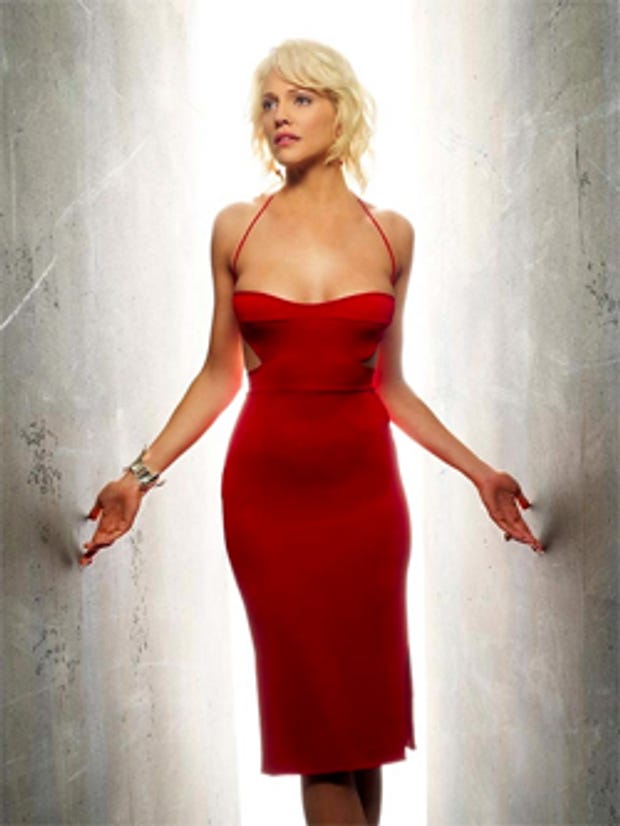Why Is Six Hypersexualized in Battlestar Gallactica?
It's because she's enslaved.
The 2000 Battlestar Galactica reboot is mostly an exercise in grimy world building, apocalypse and despair. One odd note though is the character of Six. Played by Tricia Helfer, Six is an enemy Cylon robot in human skin—and we see a lot of skin. She wears a plunging tight red dress with straps, and throws herself at various male humans, most notably amoral science genius Gaius Baltar (James Callis). With her high heels and predatory air, she’s a red fetish domme striding through a show that mostly looks more like a boiler room than a sex dungeon.
Extra-diegetically, Six’s hypersexuality is there to provide a fairly dour show with some sex appeal—even the name is a nod to Voyager’s popular sexy android figure, Seven of Nine (BG creator Ronald D. Moore worked on Voyager briefly.) But that doesn’t exactly explain what the deal is with sexy androids in the first place, or why creators rushed almost first thing in the show towards sexy Cylons.
So what is the deal with sexy domme androids?
I think the deal is that androids are metaphors for enslaved people, and enslaved women get hypersexualized because they are the targets of sexual violence.
As in other robot narratives going back to the play R.U.R.in 1921, the Cylons were created by humans to serve them, then attained sentience and rebelled. The series is essentially about a slave revolt. The grim aura of despair and apocalypse is borrowed from anxieties about revolution. What if the people we oppress rose up and treated us with the same genocidal logic with which we treat them? The Cylons want to exterminate humanity because they are worried that humans will, if left to their own devices, find a way to resubjugate their former victims.
Enslavers project their own violence onto their victims. Thus, because Black people were victims of shocking, brutal violence and genocide, Black people are portrayed as criminals who perpetrate shocking brutal violence and genocide. Those narratives and ideas are echoed in the Cylons, who are here slotted into the role of enslaved people.
Similarly, enslavers raped and sexually assaulted enslaved people—and especially enslaved women—with impunity. Thus, Black women have been characterized as hypersexual seductresses, perpetrating excessive sexuality, rather than being the victims of sexual violence. Number 6, as an enslaved woman, is sexualized because enslaved women are sexual targets. But via projection and reversal, she becomes the sexual aggressor—insatiable, dominant, irresistible. In early episodes, she appears to have violated Gaius’ mind; he has intense sexual visions of her, which could be a sign of mental illness, but also could be the result of her physically implanting a chip in his head.
In the early episodes, part of the horror of the Cylons is the guilt. Various characters (including a Cylon) suggest that the Cylons are punishment for human sins—that sin, supposedly being hubris in building them, because the sin of enslaving other sentient creatures is too close to home to be sayable. Similarly, Gaius feels guilty for allowing Six to seduce him into giving her access to humanity’s defense system—which is a displacement of the guilt of sexual assault. Gaius is presented as being rakish and exploitive, but ultimately his bad actions aren’t his fault, but the fault of the sexy woman who dominates him. The powerful are helpless, the oppressed are genocidal. That’s a familiar story, even—or especially—when it’s sexed up.
—
This piece ran some years back on my Patreon. Since our billionaire overlords are constantly whining about how oppressed they are, though, it still seemed relevant.



Really like your identifying projection and displacement as part of colonial psychology.
People tend to do what they are supported to do, and these primitive defenses can be very powerful on a mass scale, as Trump is attempting to do now.
Glad you saved this piece from the past!
I stopped watching BSG after Lee discovered the underground market catered to pedophiles and allowed the market to continue without launching every single monster who raped a child out the airlock first. BSG was sold as a Feminist show with Strong Female Characters but it was so misogynistic. The amount of violence the female characters underwent - the beatings, the rapes, forced prostitution, forced births, the mind games - most of it gratuitous, proved to me that Moore was another Whedon.